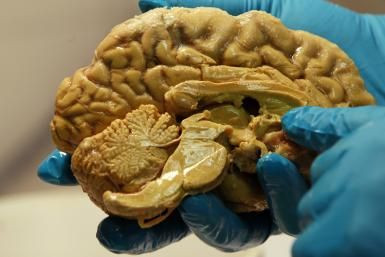IBM's AI Is Improving Healthcare By Advancing Cancer, Schizophrenia Research

A team of researchers from the University of Alberta, Canada and tech giant IBM has developed artificial intelligence and machine learning algorithms, which can diagnose schizophrenia by studying the blood flow of the brain.
Mina Gheiratmand, the lead author of the study published in the journal Nature, said the algorithm was able to provide diagnosis with 74 percent accuracy.
Using the algorithm, doctors might not just be able to be diagnose the disease but even determine its severity using a simple MRI scan and the AI-based neural network, which studies the blood flow.
Read: How AI Technology Adoption In Healthcare Is Changing The Industry
"This unique, innovative multidisciplinary approach opens new insights and advances our understanding of the neurobiology of schizophrenia, which may help to improve the treatment and management of the disease," Serdar Dursun, a professor of psychiatry & neuroscience with the University of Alberta, said in a statement to Engadget.
The researchers studied 95 subjects, including 46 schizophrenia patients.
The study of the human brain has been a challenging medical field, especially brain related ailments such as Schizophrenia. AI might make data interpretation easy, which would help doctors and researchers create better studies about such diseases. Combined with image recognition, which is also powered by AI, input from X-rays and MRIs can be interpreted in a much better way and on a much larger scale.
The team behind the research also aims to employ the algorithm in research for other diseases such as Huntington’s disease, and provide a better insight into a brain afflicted with them.
"We've discovered a number of significant abnormal connections in the brain that can be explored in future studies and AI-created models bring us one step closer to finding objective neuroimaging-based patterns that are diagnostic and prognostic markers of schizophrenia," Dursun further added
AI is no way near providing a cure for such diseases, but it can be useful in advancing research undertaken in those fields, and can result in better analysis and diagnosis.
IBM, a company known for its computer systems, has shown interest in the deployment of AI in healthcare. The company’s AI software called Watson is being employed in genomics research for cancer. The company is creating a specialized interface and software for cancer researchers, which would help in sequencing the human genome.
The IBM Watson can also glean through medical journals and come out with solutions for problems at hand for medical professionals. Tracing the problem by analyzing the genomes of cancer patients could suggest treatments or even further research towards a cure.
But the challenge which remains for the employment of AI in healthcare is rooting out anomalies in medical research, since even a slight error in the base information could cause inaccuracies in the end result.
© Copyright IBTimes 2025. All rights reserved.



















